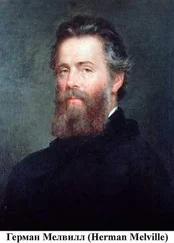Hunilla now sought to settle precisely in her mind, to an hour, how long it was since the ship had sailed; and then, with the same precision, how long a space remained to pass. But this proved impossible. What present day or month it was she could not say. Time was her labyrinth, in which Hunilla was entirely lost.
And now follows—
Against my own purposes a pause descends upon me here. One knows not whether nature doth not impose some secrecy upon him who has been privy to certain things. At least, it is to be doubted whether it be good to blazon such. If some books are deemed most baneful and their sale forbid, how, then, with deadlier facts, not dreams of doting men? Those whom books will hurt will not be proof against events. Events, not books, should be forbid. But in all things man sows upon the wind, which bloweth just there whither it listeth; for ill or good, man cannot know. Often ill comes from the good, as good from ill.
When Hunilla—
Dire sight it is to see some silken beast long dally with a golden lizard ere she devour. More terrible, to see how feline Fate will sometimes dally with a human soul, and by a nameless magic make it repulse a sane despair with a hope which is but mad. Unwittingly I imp this cat–like thing, sporting with the heart of him who reads; for if he feel not he reads in vain.
—"The ship sails this day, to–day," at last said Hunilla to herself; "this gives me certain time to stand on; without certainty I go mad. In loose ignorance I have hoped and hoped; now in firm knowledge I will but wait. Now I live and no longer perish in bewilderings. Holy Virgin, aid me! Thou wilt waft back the ship. Oh, past length of weary weeks—all to be dragged over—to buy the certainty of to–day, I freely give ye, though I tear ye from me!"
As mariners, tost in tempest on some desolate ledge, patch them a boat out of the remnants of their vessel's wreck, and launch it in the self–same waves, see here Hunilla, this lone shipwrecked soul, out of treachery invoking trust. Humanity, thou strong thing, I worship thee, not in the laureled victor, but in this vanquished one.
Truly Hunilla leaned upon a reed, a real one; no metaphor; a real Eastern reed. A piece of hollow cane, drifted from unknown isles, and found upon the beach, its once jagged ends rubbed smoothly even as by sand–paper; its golden glazing gone. Long ground between the sea and land, upper and nether stone, the unvarnished substance was filed bare, and wore another polish now, one with itself, the polish of its agony. Circular lines at intervals cut all round this surface, divided it into six panels of unequal length. In the first were scored the days, each tenth one marked by a longer and deeper notch; the second was scored for the number of sea–fowl eggs for sustenance, picked out from the rocky nests; the third, how many fish had been caught from the shore; the fourth, how many small tortoises found inland; the fifth, how many days of sun; the sixth, of clouds; which last, of the two, was the greater one. Long night of busy numbering, misery's mathematics, to weary her too–wakeful soul to sleep; yet sleep for that was none.
The panel of the days was deeply worn—the long tenth notches half effaced, as alphabets of the blind. Ten thousand times the longing widow had traced her finger over the bamboo—dull flute, which played, on, gave no sound—as if counting birds flown by in air would hasten tortoises creeping through the woods.
After the one hundred and eightieth day no further mark was seen; that last one was the faintest, as the first the deepest.
"There were more days," said our Captain; "many, many more; why did you not go on and notch them, too, Hunilla?"
"Señor, ask me not."
"And meantime, did no other vessel pass the isle?"
"Nay, Señor;—but—"
"You do not speak; but what , Hunilla?"
"Ask me not, Señor."
"You saw ships pass, far away; you waved to them; they passed on;—was that it, Hunilla?"
"Señor, be it as you say."
Braced against her woe, Hunilla would not, durst not trust the weakness of her tongue. Then when our Captain asked whether any whale–boats had—
But no, I will not file this thing complete for scoffing souls to quote, and call it firm proof upon their side. The half shall here remain untold. Those two unnamed events which befell Hunilla on this isle, let them abide between her and her God. In nature, as in law, it may be libelous to speak some truths.
Still, how it was that, although our vessel had lain three days anchored nigh the isle, its one human tenant should not have discovered us till just upon the point of sailing, never to revisit so lone and far a spot, this needs explaining ere the sequel come.
The place where the French captain had landed the little party was on the further and opposite end of the isle. There, too, it was that they had afterwards built their hut. Nor did the widow in her solitude desert the spot where her loved ones had dwelt with her, and where the dearest of the twain now slept his last long sleep, and all her plaints awaked him not, and he of husbands the most faithful during life.
Now, high, broken land rises between the opposite extremities of the isle. A ship anchored at one side is invisible from the other. Neither is the isle so small, but a considerable company might wander for days through the wilderness of one side, and never be seen, or their halloos heard, by any stranger holding aloof on the other. Hence Hunilla, who naturally associated the possible coming of ships with her own part of the isle, might to the end have remained quite ignorant of the presence of our vessel, were it not for a mysterious presentiment, borne to her, so our mariners averred, by this isle's enchanted air. Nor did the widow's answer undo the thought.
"How did you come to cross the isle this morning, then, Hunilla?" said our Captain.
"Señor, something came flitting by me. It touched my cheek, my heart, Señor."
"What do you say, Hunilla?"
"I have said, Señor, something came through the air."
It was a narrow chance. For when in crossing the isle Hunilla gained the high land in the centre, she must then for the first have perceived our masts, and also marked that their sails were being loosed, perhaps even heard the echoing chorus of the windlass song. The strange ship was about to sail, and she behind. With all haste she now descends the height on the hither side, but soon loses sight of the ship among the sunken jungles at the mountain's base. She struggles on through the withered branches, which seek at every step to bar her path, till she comes to the isolated rock, still some way from the water. This she climbs, to reassure herself. The ship is still in plainest sight. But now, worn out with over tension, Hunilla all but faints; she fears to step down from her giddy perch; she is fain to pause, there where she is, and as a last resort catches the turban from her head, unfurls and waves it over the jungles towards us.
During the telling of her story the mariners formed a voiceless circle round Hunilla and the Captain; and when at length the word was given to man the fastest boat, and pull round to the isle's thither side, to bring away Hunilla's chest and the tortoise–oil, such alacrity of both cheery and sad obedience seldom before was seen. Little ado was made. Already the anchor had been recommitted to the bottom, and the ship swung calmly to it.
But Hunilla insisted upon accompanying the boat as indispensable pilot to her hidden hut. So being refreshed with the best the steward could supply, she started with us. Nor did ever any wife of the most famous admiral, in her husband's barge, receive more silent reverence of respect than poor Hunilla from this boat's crew.
Rounding many a vitreous cape and bluff, in two hours' time we shot inside the fatal reef; wound into a secret cove, looked up along a green many–gabled lava wall, and saw the island's solitary dwelling.
Читать дальше








